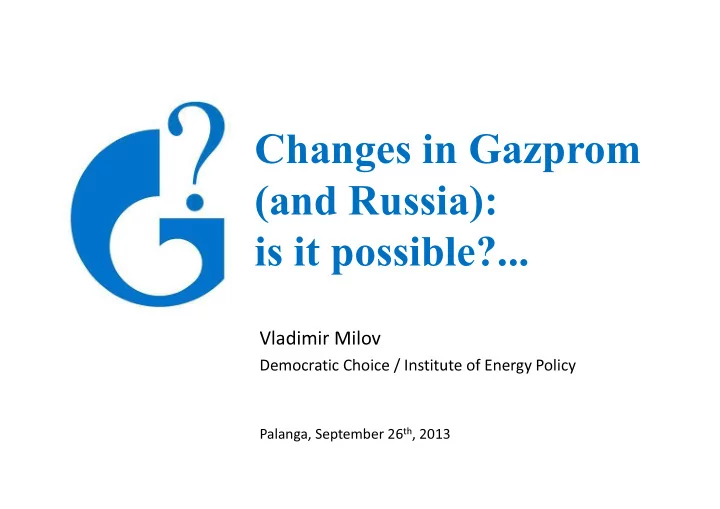

Changes in Gazprom (and Russia): is it possible?... is it possible?... Vladimir Milov Democratic Choice / Institute of Energy Policy Palanga, September 26 th , 2013
Gazprom: remember 2008… In 2008, Gazprom had hit record highs in gas • exports to Europe – supplies had exceeded 150 bcm per year Forecasts were that Gazprom would soon supply • 200-220 bcm to Europe, and then – only sky is the limit
But something went wrong Supplies of Russian pipeline gas to Europe and former USSR, bcm 158,8 Europe 138,8 Former USSR 78,6 64,4 2008 2012 Source: Gazprom quarterly FSFR reports
Don’t blame it on the crisis: at the same time, Russia’s competitors have gained Supplies of gas from Qatar and Norway to Europe (including Turkey), bcm 109,7 94,2 Qatar Qatar Norway 31,1 7,9 2008 2012 Source: BP Statistical Review of World Energy
Most countries had reduced purchases of Russian gas Estonia -1,1% Belarus -3,6% Czech Republic -4,3% Purchases of Russian gas 2012 vs. 2008, % Germany -7,8% Austria -10,3% -11,6% Greece Switzerland Switzerland -12,8% -12,8% France -22,8% Finland -23,1% Bulgaria -27,3% Ukraine -30,3% Slovakia -31,8% -32,8% Italy Romania -39,3% Hungary -40,6% Netherlands -46,7% -62,8% Former Yugoslavia Source: Gazprom quarterly FSFR reports
…with just a few exceptions, which do not change the overall picture Purchases of Russian gas 2012 vs. 2008, % Latvia 50,3% UK 29,1% Poland 25,5% Moldova 13,4% Turkey 13,3% Lithuania 7,4% Source: Gazprom quarterly FSFR reports
Ukraine: the biggest market, the most catastrophic market loss Purchases of Russian gas by Ukraine, 2008-2012, bcm 54,3 47,2 40,0 37,8 36,5 36,5 32,7 9,7 2007 2008 2009 2010 2011 2012 6m 2013 Source: Gazprom Source: Gazprom quarterly FSFR reports
How diversification works: Ukrainian case Shares of natural gas and coal in Ukrainian primary energy mix 2008-2012, % 40,9% 35,6% 35,6% Natural gas Natural gas 30,4% 30,4% Coal 2008 2012 Source: BP Statistical Review of World Energy
Why?... Holding on to outdated long-term contract system and • pricing formulas in rapidly changing competitive environment proved to be a grave mistake In case of Ukraine, price wars waged in 2006 and 2009 • and the subsequent price hikes have paid back
Who had overslept this and why? At Gazprom, decision making is dominated by inertia: • � Inertia inherited by this never reformed company from the Soviet centralized system (it’s basically a former Soviet Ministry) � Additional inertia brought in by Putin’s “vertical strengthening” (meaning – further monopolization) policies That’s why Gazprom had been fiercely defending the • outdated contract and pricing system in changing competitive conditions, despite severe loss of market… …inertia continues to be at work •
China? • In March 2006, agreements were signed in Beijing on massive supplies of Russian gas to China • Almost eight years down the road, Western corridor project (Altai) is dead, there are price disagreements which prevent disagreements which prevent contracts re. Eastern corridor from being signed • Meanwhile, gas pipeline from Turkmenistan to China is up and running since 2009 Too early to drink champagne just yet.
Why China so tough on gas import prices? Chinese primary energy mix, % Chinese gas production and consumption, bcm 160 Gas consumption 4,7% 140 Indigenous gas production 120 100 Natural gas 80 Other 60 95,3% 40 20 0 2004 2005 2006 2007 2008 2009 2010 2011 2012 China is not strongly dependent on imported gas. Source: BP Statistical Review of World Energy
What conclusions for Baltic states? Russian gas in Baltic countries total primary energy supply, % (source: IEA) Estonia Latvia Lithuania 9,0% 29,5% 37,3% Russian gas Other 62,7% 91,0 % Learn from countries who diversify energy imports. Encourage competition.
Gazprom competitive reform: potentially a “win-win-win” case • Russian economy becomes more competitive through containing growth of domestic gas prices Russian economy wins • Ineffective investment and corruption greatly reduced • Russia stops losing international market after shrugging off Gazprom’s outdated pricing and Russian gas industry wins contract policies • Europe receives competitive gas supplies from the East under fair prices without further political and Europe wins monopoly pressure
Can Gazprom be changed? Reforming Gazprom into open and competitive gas • industry was key element of economic reform plan back in 2000 However, Putin had toughly opposed that • Gazprom was a central element to Putin’s philosophy • of monopolization and centralization As long as Putin stays in power, Gazprom will most • likely not be reformed
Recommend
More recommend